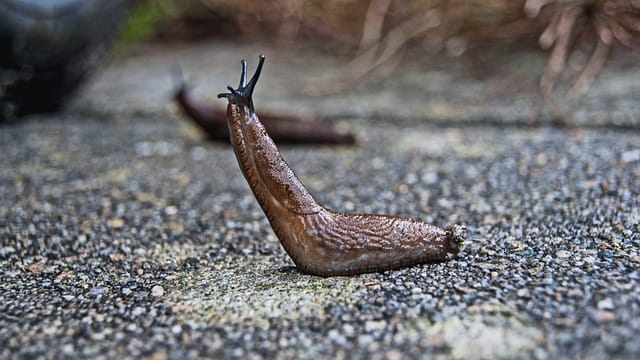Fighting gardening pests: Slugs
Slugs are slimy creatures that often wreak havoc in gardens, feeding on plants and causing damage to foliage, fruits, and vegetables

In this article:
- Introduction to slugs as common gardening pests
- Identifying different species of slugs
- Understanding the lifecycle and habitat of slugs
- Signs of slug infestation in the garden
- Physical barriers and traps to deter slugs
- Organic methods for controlling slugs
- Chemical options for slug control
- Companion planting to repel slugs
- Natural predators of slugs in the garden
- Preventative measures to minimize slug damage
- Common mistakes to avoid in slug control
- Potential risks and drawbacks in slug control methods
- Dealing with slug damage and salvaging affected plants
- Sustainable and eco-friendly gardening practices to reduce slug populations
- Tips and tricks for a slug-free garden
- Frequently asked questions (FAQs) about slugs and their control
Introduction to slugs as common gardening pests
Slugs are slimy creatures that often wreak havoc in gardens, feeding on plants and causing damage to foliage, fruits, and vegetables. Their presence can be detrimental to the overall health and appearance of your garden. Understanding more about slugs and their behavior is crucial in implementing effective control measures to protect your plants.
Identifying different species of slugs
There are various species of slugs found in gardens, and being able to identify them correctly can help target control methods more effectively. Different species have slightly different habits and preferences, so understanding their characteristics will assist you in determining the best approach for eliminating them.
Understanding the lifecycle and habitat of slugs
Knowing the lifecycle and preferred habitats of slugs can aid in predicting their behavior and implementing control measures at the right time. Understanding when slugs are most active and where they hide can help you plan your pest management strategies accordingly.
Signs of slug infestation in the garden
Identifying the signs of slug infestation is crucial to taking action promptly. Slime trails, chewed leaves, and missing seedlings are just a few indications that there might be slugs in your garden. Being vigilant and identifying these signs early can prevent a small problem from turning into a full-blown infestation.
Physical barriers and traps to deter slugs
Creating physical barriers and using traps is an effective way to deter slugs from reaching your plants. From copper tape and barriers to beer traps and handpicking, there are various methods you can employ to physically discourage slugs from entering your garden and protect your plants.
Organic methods for controlling slugs
For those who prefer organic gardening practices, there are numerous natural and eco-friendly methods for controlling slugs. From using coffee grounds and eggshells to diatomaceous earth and natural predators, these techniques offer effective and environmentally safe alternatives to traditional pest control methods.
Chemical options for slug control
If organic methods are not yielding satisfactory results, it might be necessary to explore chemical options for slug control. While chemical means should be used as a last resort, understanding the different types of slug control products available and their proper application can help mitigate slug populations effectively.
Companion planting to repel slugs
Companion planting involves strategically placing certain plants alongside susceptible crops to repel slugs naturally. By harnessing the power of specific scents and natural repellents, companion planting can create an inhospitable environment for slugs and minimize damage to your garden.
Natural predators of slugs in the garden
Introducing natural slug predators into your garden can help naturally control the slug population. Encouraging the presence of creatures such as frogs, birds, hedgehogs, and ground beetles can create a balance in your garden ecosystem and keep slug numbers in check.
Preventative measures to minimize slug damage
Prevention is often better than a cure when it comes to managing slug damage. Taking proactive steps such as proper garden maintenance, maintaining good drainage, eliminating slug-friendly hiding spots, and removing debris can go a long way in preventing slug infestations and minimizing plant damage.
Common mistakes to avoid in slug control
While dealing with slugs, there are several common mistakes that gardeners should avoid. These mistakes, such as using ineffective control methods or failing to address the root cause of the infestation, can hinder your efforts and make it harder to achieve success in slug control.
Potential risks and drawbacks in slug control methods
It is important to understand the potential risks and drawbacks associated with different slug control methods. Some control measures might harm beneficial creatures, pollute the environment, or pose health risks. Being aware of these risks will help you make informed decisions and choose the safest and most effective slug control methods for your garden.
Dealing with slug damage and salvaging affected plants
Despite the best preventive efforts, slugs might still manage to cause damage to your plants. Knowing how to identify and address slug damage promptly can help save your plants from further harm. Implementing recovery methods can aid in salvaging affected plants and nursing them back to health.
Sustainable and eco-friendly gardening practices to reduce slug populations
Adopting sustainable and eco-friendly gardening practices can significantly reduce slug populations in the long run. By creating a healthy and balanced garden ecosystem, you can naturally discourage slugs from thriving and keep their numbers in check without resorting to harmful or toxic control methods.
Tips and tricks for a slug-free garden
Alongside the specific techniques and methods, implementing some general tips and tricks can help maintain a slug-free garden. From regular inspections and maintaining cleanliness to nurturing healthy plants and implementing a diverse planting strategy, these tips can complement your slug control efforts and promote overall garden well-being.
Frequently asked questions (FAQs) about slugs and their control
Addressing frequently asked questions about slugs and their control can provide additional insights and guidance. From questions about slug behavior and prevention to specific control methods and troubleshooting, these FAQs cover common concerns that gardeners may have when dealing with slugs.
